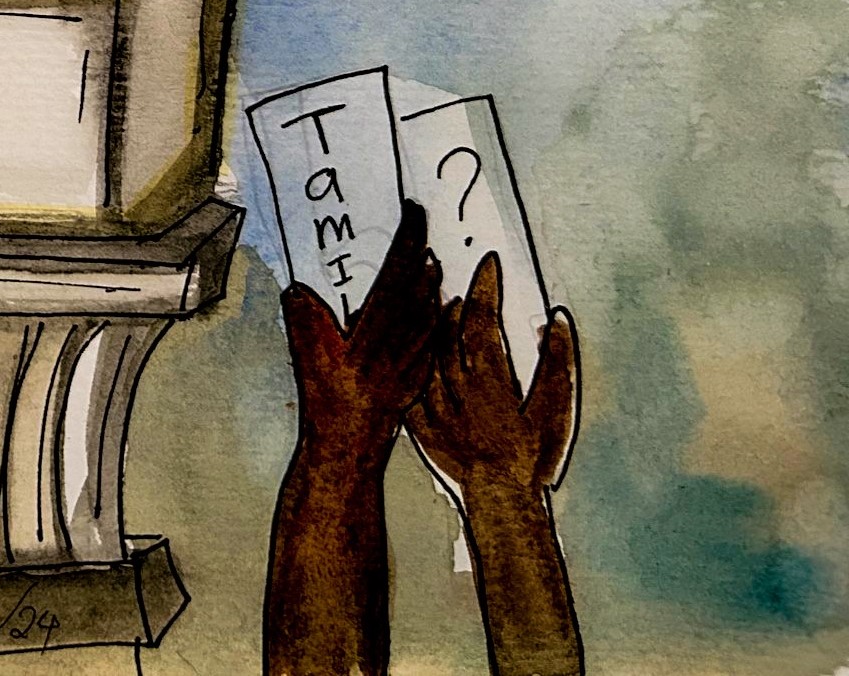
Illustration by Keera Ratnam / wavesofcolour
The Tamil Guardian hosted the first ever British Tamil community hustings event in London on Thursday evening. The event was historic - not only for its senior level of representation from British political parties, but also for showcasing how deeply important justice for genocide and securing Tamil rights remains for hundreds of thousands across the United Kingdom.
If the polls are correct, a Labour government looks increasingly likely, with Keir Starmer set to secure one of the biggest majorities that the country has seen in decades. On these issues, he has been vocal. In recent years, the man set to occupy Number 10 has released repeated statements praising British Tamils and stressing the need to secure justice for the atrocities Tamils faced at the hands of the Sri Lankan state. This year alone, he released a letter to mark Mullivaikkal Genocide Remembrance Day and spoke on the “sacrifices made by the Tamil people for self-determination”. As the former Director of Public Prosecutions, Starmer boasts of his record of prosecuting criminals. His calls to refer Sri Lanka to the International Criminal Court (ICC), so that justice can finally be served and war criminals held to account, are therefore significant.
This was a view that the current Shadow Minister for Asia echoed to British Tamils on Thursday. Catherine West spoke of how, for herself, and for Shadow Foreign Secretary David Lammy, referring Sri Lanka to the ICC and pressing Magnitsky-style sanctions on Sri Lankan individuals were areas where work could be done “quickly”. “It is curious” as to why such sanctions had not been placed thus far, said West as she committed her party to push forward such moves. It is a view that Tamils across Britain undoubtedly share. They will be hopeful the Labour Party’s pledges are swiftly enacted so that justice can finally be served. Tamils will be watching the next steps cautiously and very carefully, particularly given that it was a Labour government in power when the Mullivaikkal genocide of 2009 took place. The inaction of the Blair and Brown governments whilst the massacres took place must be made up for.
Deputy Foreign Secretary Andrew Mitchell also reiterated his party’s commitment to seeing justice for the Tamil people, but for many it would have been too slow. 14 years of a Conservative-led government have had only a few glimmers of hope for accountability, such as when former Prime Minister and current Foreign Minister David Cameron visited Jaffna in 2013, directly meeting with human rights defenders and pledging to secure justice for the massacres. Though Britain led successive resolutions at the UN Human Rights Council, it is clear now that they have borne little progress. As international action stalled, years of malaise followed with successive Sri Lankan governments being appeased by British officials, rather than being firmly held to account. Ultimately, Colombo has been let off the hook and Sri Lankan war criminals have continued to roam free. There have still been no prosecutions and there is still no justice. Indeed, in its manifesto even the Conservative Party itself acknowledged that it must ‘redouble efforts’ on Sri Lanka.
Accountability for the mass atrocities though, clearly remains an issue that cuts across party lines, with all the speakers in London proclaiming their support for it. Other key topics such as the recognition of the Tamil genocide, supporting self-determination for the Tamil people and an independence referendum were all matters that were keenly discussed. Green Party spokesperson Benali Hamdache was unwavering in his bold support of the Tamil cause, and as he articulated how the Tamil people “deserve politicians who will work hard for you on the international stage”.
With a new British government set to be formed in just a few short weeks, the issues of justice for mass atrocities and the quest for Tamil liberation will clearly continue to remain firmly on the agenda. Whoever looks to steer Britain on the global stage next cannot afford to ignore them.
